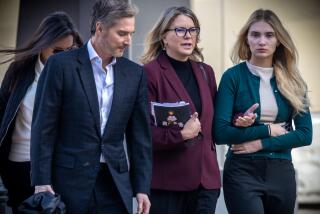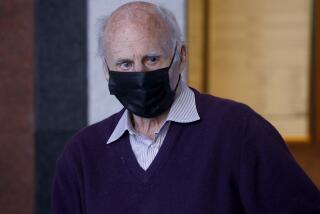Todd Won’t Step Down at Tampering Hearing
- Share via
The judge in Mayor Roger Hedgecock’s felony conspiracy and perjury case has refused to remove himself from a hearing on jury-tampering allegations involving his own bailiff, ruling that the defense request “discloses no legal ground” for his removal.
Contending that Superior Court Judge William L. Todd Jr.’s refusal to disqualify himself from the hearing, set for Monday, creates “the appearance . . . of possible impropriety,” Hedgecock’s attorneys said Tuesday that they plan to appeal the decision.
Meanwhile, Stanley J. Bohensky, one of two jurors who have alleged that bailiff Al Burroughs Jr. tampered with the jury during its 6 1/2-day deliberations, signed a sworn statement Tuesday detailing those charges. Bohensky prepared the new statement after Todd described as “inadmissible hearsay” an earlier sworn document in which Bohensky’s attorney, John Learnard, listed his client’s allegations.
In his four-page affidavit, Bohensky charged that, among other things, the bailiff:
- Explained to him how to interpret jury instructions.
- Discussed the crucial legal term of “reasonable doubt” while telling jurors a now-controversial anecdote about another case in which jurors got into a fistfight over disputed evidence.
- Urged jurors to “reach a speedy verdict” because the hotel in which they were sequestered during their deliberations cost “taxpayers a lot of money.”
- Asked Bohensky to “take notes on what any unreasonable jurors were saying” during deliberations.
- Told Bohensky and jury foreman Richard Stark that both he (Burroughs) and Todd hoped that the jury would reach a verdict, rather than deadlocking, saying, “ ‘We don’t care how it comes out as long as it’s all one way or the other.’ ”
- Sometimes drank alcoholic beverages with the jurors. On the jury’s final day of deliberations, Bohensky said, one juror was “so hung over” that she had to frequently excuse herself “to throw up.”
Hedgecock’s attorney, Oscar Goodman, said Tuesday that “any one of those actions” attributed to Burroughs in Bohensky’s sworn statement “is more than sufficient” for Hedgecock’s 13-count felony conviction to be reversed, despite the fact that 10 other jurors have said they do not believe that the bailiffs acted improperly during deliberations.
Bohensky’s statement came as Hedgecock’s attorneys stepped up their legal battle to prevent the mayor’s possible ouster from office next week.
Hoping to overturn Todd’s decision to remain on the case, Goodman and Hedgecock’s other attorney, Michael Pancer, said that they plan to ask the 4th District Court of Appeal to rule this week on whether Todd should preside over the Monday hearing. If Hedgecock loses his request for a new trial at that hearing, he could be forced from office two days later, when Todd is scheduled to sentence the mayor on his 13-count felony conviction.
“Right now, by (Todd) sitting in judgment of allegations against his own bailiff, there always will be a pall over the proceeding as to whether or not any impropriety took place because of the close relationship between them,” Goodman said. “As far as I’m concerned, the judge’s position, with all due respect to the judge, is legally incorrect.”
In earlier motions seeking Todd’s removal from the hearing on a new trial, Goodman noted that the defense intended to call the judge to testify and that Burroughs is “an arm of (Todd’s) court.” One of Goodman’s filings also argued that Todd “has a personal bias for his bailiff,” adding that the defense would face “a much greater burden to convince Judge Todd of Burroughs’ misconduct than if the matter were presented to another judge.”
“It would be as though . . . somebody were saying nasty things about a member of his family, and of course, he would be very protective,” Goodman said. “We wanted to avoid not only the appearance of impropriety, but actual impropriety . . . . Judge Todd would naturally be inclined to protect his bailiff.”
However, in a four-page order Monday, Todd, who heard both of Hedgecock’s trials, ruled that the defense’s motion “discloses no legal ground for (the judge’s) disqualification.” In addition, Todd ruled that Goodman cannot call the judge to testify at next week’s hearing, and dismissed most of the defense’s jury-tampering evidence as “conclusionary . . . and inadmissible hearsay.”
Todd’s decision reiterated many of the same legal points made in briefs filed by Dist. Atty. Edwin Miller in opposition to Goodman’s request for a new trial. In urging that Goodman’s new-trial motion be rejected “out of hand without even holding a hearing,” Miller also referred to evidence submitted by the defense in support of the jury-tampering claims as “inadmissible evidence and hearsay.”
While disappointed by Todd’s decision not to disqualify himself, Pancer emphasized that he “wouldn’t want to draw any conclusions as to how the motion for a new trial will come out based” on the judge’s ruling Monday.
At next week’s hearing, the defense hopes to present testimony from the jurors and the bailiffs in order to, in Goodman’s words, “produce the full picture of what happened.” Miller, however, said that prosecutors will oppose such testimony, saying that the jurors’ statements would be “sufficient” because new-trial hearings commonly “are handled in a very limited fashion (without) full-blown cross-examination.” Todd has given no indication to date of whether he would allow testimony at the hearing.
Tuesday’s developments marked the latest twist in Hedgecock’s case since the mayor’s legal status was thrown into limbo two weeks ago when juror Kathy Saxton-Calderwood and Bohensky’s attorney signed sworn statements alleging that Burroughs, in violation of court rules, talked on numerous occasions with jurors about the case and the progress in their 6 1/2-day deliberations.
However, sworn documents from the 10 other jurors, filed by Miller’s office Monday, disputed those allegations, and were cited by the district attorney as proof that “there was not anything even remotely approaching jury tampering.”
Pancer argued Tuesday that the jurors’ affidavits filed by Miller’s office “tend to substantiate our position that there was misconduct and jury-tampering” in Hedgecock’s case. Pancer noted, for example, that some of those jurors’ statements confirmed that Burroughs had, indeed, told them an anecdote about another case dealing with “reasonable doubt.”
While most of the 10 jurors said they viewed the bailiff’s story as a joke, Goodman argues that the bailiff’s “mere telling of the tale” was improper and is sufficient grounds for overturning Hedgecock’s conviction on conspiracy and perjury charges stemming from contributions to his 1983 mayoral campaign.
In addition, jury foreman Stark, one of the 10 jurors whose statements were released by Miller, confirmed that Burroughs discussed the cost of the Mission Valley hotel where the jurors were sequestered. In his affidavit, Stark wrote, “I do recall Mr. Burroughs making a comment . . . that sequestering the jury was expensive and that the jurors were expected to reach a decision.”
“A jury is not permitted to be instructed by the bailiff, they’re not permitted to take into account the cost of their sequestration, and clearly this could have had an effect on the jury reaching a verdict,” Pancer said.
Meanwhile, in his statement Tuesday, Bohensky listed a series of purported improprieties by Burroughs, specifying the days on which the events allegedly occurred. Although he prompted the initial disclosure of the jury-tampering allegations, Bohensky also has persistently said that he believes Hedgecock is guilty--an assertion that the defense argues lends credence to his complaints about the bailiff’s behavior.
Bohensky said that, at the outset of the jury’s deliberations, he asked Burroughs how to interpret a list of nearly 100 jury instructions, a complex compilation of points of law and evidence in the case read to the jurors by Todd just before they retired to ponder their verdict. Bohensky quoted Burroughs as replying, “With common sense; look at them as a whole, and don’t get hung up on one sentence.”
On the second day of deliberations, Bohensky swore that Burroughs “told me to mention to the rest of the jury that this sequestration was costing the taxpayers a lot of money; we didn’t have to be treated as nice as this, and that we should reach a speedy verdict.”
“Almost everyday” throughout the deliberations, Bohensky said, Burroughs “told me he didn’t care how the verdict came out, as long as it came out all one way or the other.”
In an allegation that contradicts Stark’s own sworn statement, Bohensky also charged that Burroughs “told Stark and myself that . . . Judge Todd wanted to know if we were making progress and if there were any unreasonable jurors.” However, in his statement, Stark said, “Mr. Burroughs never asked me, or any other juror in my presence, to keep a list of unreasonable jurors or any other type of jurors.”
At another point, Burroughs and bailiff Holly Murlin, who also helped supervise the jury, entered Bohensky’s hotel room “and began telling us of their experience with other juries,” Bohensky wrote. During that discussion, the bailiffs mentioned two other jurors by name--Kathy Saxton-Calderwood and Dolores Pickering--and speculated about how both jurors might vote, Bohensky said.
“They collectively told us, ‘Don’t worry about Di Pickering, she’ll come around, it’s Kathy that you guys are going to have trouble with,’ ” Bohensky’s statement said.
Providing yet another explanation of perhaps the most celebrated incident during the jury’s deliberations, Bohensky’s statement also provided details concerning Burroughs’ recitation of an anecdote about another case--an incident that the jurors referred to as “the green hat story.”
Most other jurors have confirmed that Burroughs told them the story--which involved a physical altercation between two jurors in another case stemming from a dispute over evidence--but have said that they viewed the anecdote as a joke and not, as Saxton-Calderwood described it, an explanation of “reasonable doubt.”
Bohensky’s statement, however, corroborates Saxton-Calderwood’s version of events. “The green hat story was often mentioned during deliberations while we were talking about reasonable doubt,” he wrote.
In addition, Bohensky said that Burroughs occasionally drank alcoholic beverages with the jurors. On the final day of deliberations, Bohensky said, one juror “was so hung over, she had to go to the bathroom every 15 minutes to throw up.” At that point, Bohensky added, “We hadn’t even discussed several counts and hadn’t had our final binding vote on any counts.”
Their confidence bolstered by Bohensky’s sweeping allegations, Hedgecock’s attorneys said Tuesday that, even if they fail in their effort to disqualify Todd from the case, they remain confident that they will get a new trial.
“I think there’s enough evidence of clear misconduct that, no matter which judge hears this motion, he’ll have to grant a new trial,” Goodman said.
More to Read
Sign up for Essential California
The most important California stories and recommendations in your inbox every morning.
You may occasionally receive promotional content from the Los Angeles Times.













